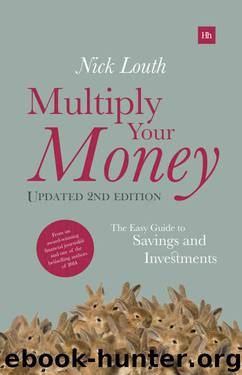Multiply Your Money: The Easy Guide to Savings and Investments by Nick Louth

Author:Nick Louth [Louth, Nick]
Language: eng
Format: epub
Publisher: Harriman House
Published: 2015-03-26T22:00:00+00:00
Big Firm
Small Firm
Combined
Net earnings
£1,000
£500
£1,500
Shares in issue
20,000
5,000
25,000
EPS
£0.05
£0.10
£0.06
Share price
£1
£1
£1
P/E
20
10
16.7
Market value
£20,000
£5,000
£25,000
In reality, matters are even worse. Takeovers are usually conducted at a premium to the target company’s share price, which will eat into the earnings enhancement, so it is beholden to the acquirer to estimate how much money they will save. This is often made to sound very precise, but I am convinced that some companies work out how big the savings need to be to justify the takeover, and only then work out what operations at the target company will be chopped or sold.
Buyouts
A buyout means a company returns to private ownership, and is either undertaken by a private equity company or by management. Private equity companies usually substitute debt for equity, and chop costs hard to get a quick return. Some have been pilloried for selling off valuable land and property, loading companies with debt, and paying themselves quick dividends. Most private equity companies try to get the firm sold back on the stock market within two to three years.
A management buyout is a very strong signal that management believes the market is undervaluing the company, or part of the company. The timing often means the terms offered to shareholders do not seem overgenerous.
Share buybacks
Companies can either repurchase shares in the market or, less commonly, make a public tender for a proportion of their own shareholders’ stock. Either way, it tends to boost the value of the remaining shares, first because earnings are now spread across fewer shares, and secondly because of the effect of a big extra buyer in the market. Companies sometimes buy back their shares to compensate for the dilutive effect of options granted to staff and management, or as a tax-efficient alternative to paying dividends. Occasionally shares that are bought back are not cancelled, but retained in the treasury department for use as an acquisition currency. A large share buyback is a strong signal of an undervalued stock price.
Bankruptcy
Bankruptcy, the winding up of an insolvent company, means that a court appoints a trustee (or receiver) to sell (liquidate) what is left of the assets for the benefit of creditors. While extremely common for small building firms or garages, it rarely occurs to large public companies. Size matters here. Remember the old adage:
“If you owe a bank £100 and you can’t pay, you’re in trouble. If you owe the bank £100 million and can’t pay, then the bank is in trouble.”
For the major-league indebted there are a hundred exits before the buffers, and most large failing firms succeed in taking one or another. One of the most common is administration, where an externally appointed specialist manager attempts to satisfy creditors while running the business as a going concern.
This can mean radical job cuts, dismemberment and sale of parts of the company, and the closing of unprofitable lines. It frequently means extra loans dished out by creditor banks in exchange for a larger stake in the company. The important thing to remember about bankruptcy is that an ordinary shareholder is right at the back of a very long queue for any proceeds.
Download
This site does not store any files on its server. We only index and link to content provided by other sites. Please contact the content providers to delete copyright contents if any and email us, we'll remove relevant links or contents immediately.
The Brazilian Economy since the Great Financial Crisis of 20072008 by Philip Arestis Carolina Troncoso Baltar & Daniela Magalhães Prates(105797)
International Integration of the Brazilian Economy by Elias C. Grivoyannis(75585)
The Art of Coaching by Elena Aguilar(52206)
Flexible Working by Dale Gemma;(23213)
How to Stop Living Paycheck to Paycheck by Avery Breyer(19570)
The Acquirer's Multiple: How the Billionaire Contrarians of Deep Value Beat the Market by Tobias Carlisle(12114)
Thinking, Fast and Slow by Kahneman Daniel(11803)
The Radium Girls by Kate Moore(11633)
The Art of Thinking Clearly by Rolf Dobelli(9930)
Hit Refresh by Satya Nadella(8866)
The Compound Effect by Darren Hardy(8524)
Atomic Habits: Tiny Changes, Remarkable Results by James Clear(8054)
Tools of Titans by Timothy Ferriss(7824)
Turbulence by E. J. Noyes(7716)
Change Your Questions, Change Your Life by Marilee Adams(7385)
A Court of Wings and Ruin by Sarah J. Maas(7277)
Nudge - Improving Decisions about Health, Wealth, and Happiness by Thaler Sunstein(7260)
How to Be a Bawse: A Guide to Conquering Life by Lilly Singh(7162)
Win Bigly by Scott Adams(6832)
